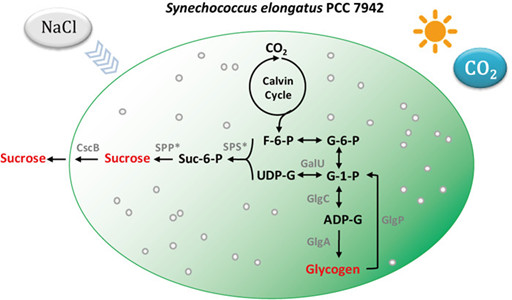Cyanobacteria, former named blue-green algae, have been attracting increasing research interest for the production of biofuels and biochemicals in recent years due to their capability to convert atmosphere CO2 and light energy to carbohydrates by oxygenic photosynthesis. Many freshwater or marine species of cyanobacteria naturally synthesize and accumulate sucrose when stressed by salt (NaCl), which provides novel possibilities for obtaining sugar feedstock by engineering of cyanobacteria.
Because sucrose and glycogen syntheses in cyanobacteria share the common precursor glucose-1-phosphate (see figure), it is generally assumed that these two processes compete for the carbon flux under salt stress. However, the metabolic engineering group at Qingdao Institute of Bioenergy and Bioprocess Technology (QIBEBT), Chinese Academy of Sciences (CAS), recently provided new insights about the role of glycogen synthesis in sucrose synthesis of cyanobacteria.
Researchers systematically analyzed the effects of reduced and enhanced glycogen pool on sucrose synthesis in an engineered freshwater cyanobacterium Synechococcus elongatus. They observed that the stepwise suppression of glycogen synthesis limited rather than stimulated sucrose production under salt stress. They also showed the combination of glycogen overproduction and sps overexpression resulted in increased sucrose production. These result suggested that glycogen could serve as a supportive rather than a competitive carbon pool for the synthesis of sucrose in cyanobacteria (see figure). This finding is useful to guide the metabolic engineering work to optimize the production of sucrose and possibly other products by cyanobacteria.
The related findings were recently published in the journal of Applied and Environmental Microbiology. This study was funded by the National Science Fund for Distinguished Young Scholars of China (31525002), the joint Sino-German research project (GZ984), the National Science Foundation of China project (31501003, and Qingdao Innovative Leading Talent project (15- 10-3-15-(31)-zch).

Figure: Salt-induced sucrose synthesis in an engineered strain of Synechoccous elongatus PCC 7942 (Image by LUO Quan)
(Text by LUO Quan)
Contact:
Prof. Dr. LU Xuefeng
Metabolic Engineering Group
Qingdao Institute of Bioenergy and Bioprocess Technology, CAS
Tel: 86-532-80662712
E-mail: lvxf@qibebt.ac.cn